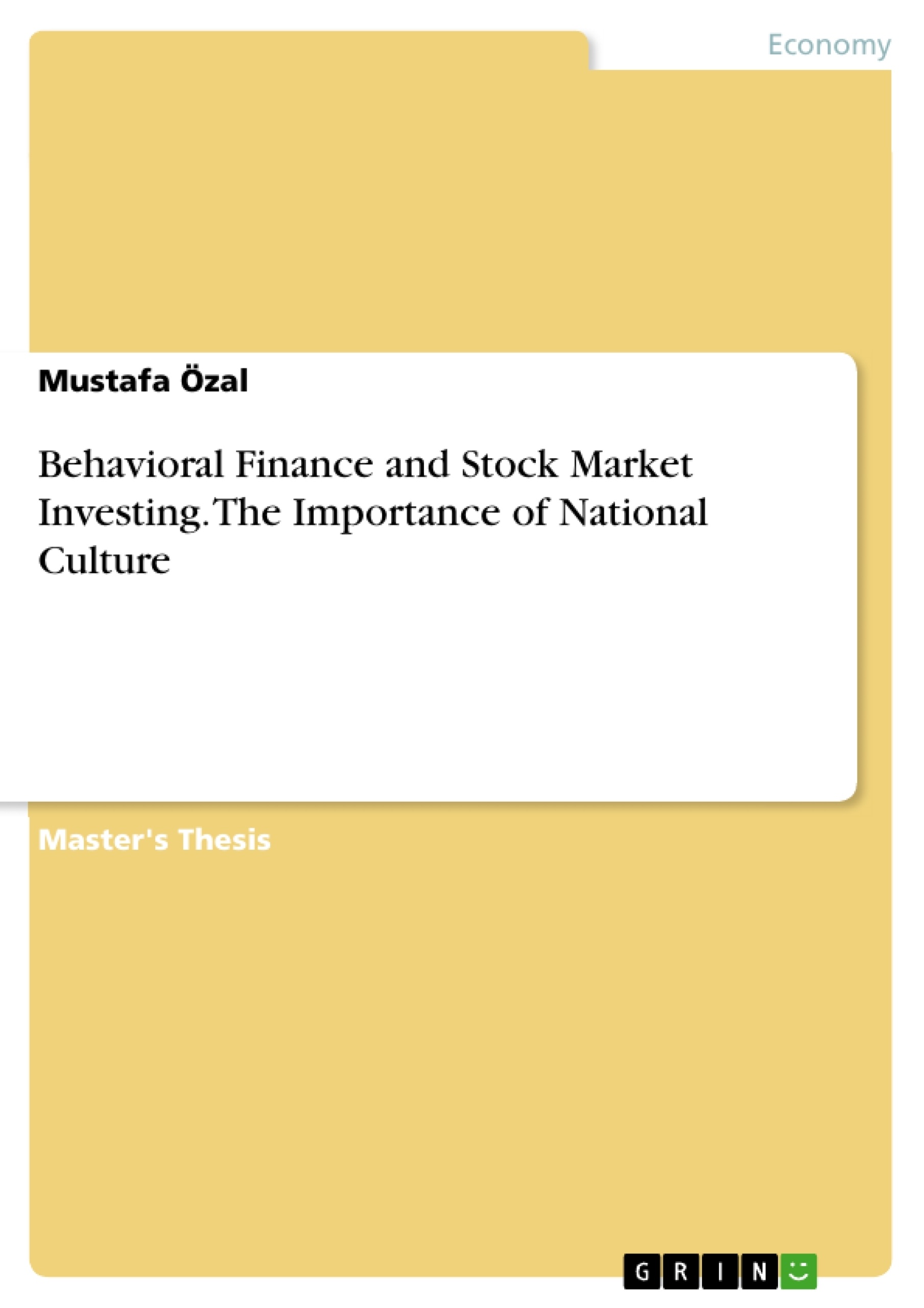The aim of this paper is to propose a model for cultural finance and to develop theory-based hypotheses on stock market investing. In contrast to the inductive financial research, a deductive approach is offered here to connect widely-accepted behavioral hypotheses on the stock market.
Understanding behavioral influences on an investor’s decision-making surprisingly has not been driven much by the acknowledgment of the mediating role of culture. While behavioral finance criticizes excessive simplifications regarding an investor’s behavior according to the homo oeconomicus, it makes the unrealistic assumption that actors exhibit universal biases and equally apply heuristics when facing different choices of action.
This paper addresses cultural finance as an important background variable and suggests a conjoint effect with behavioral finance. This means that the culture can enhance, decrease or reverse biases and heuristics which are still mostly examined in the United States and only replicated in western countries. The paper is encouraged to implement cultural finance as a future research field.
Table of Contents
- 1 Introduction
- 1.1 Overview on Topic and Motivation
- 1.2 Approach and Structure
- 2 Cultural finance as Research Field
- 2.1 Cultural Dimensions
- 2.2 Behavioral Biases and Heuristics
- 2.3 Relevance and Framework of cultural finance
- 3 Culture and Behavioral Finance
- 3.1 Risk
- 3.1.1 Attitudes towards risk
- 3.1.2 Risk perception and preference
- 3.1.3 Co-movement
- 3.2 Cross-sectional Returns
- 3.3 Style Investing
- 3.3.1 Momentum
- 3.3.2 Size
- 3.3.3 Value
- 3.3.4 Liquidity
- 3.3.5 Defensive
- 3.3.6 Carry
- 3.3.7 Resume and Remarks
- 3.1 Risk
- 4 A Paradigm Shift? - Discussion on cultural finance
- 5 Conclusion
Objectives and Key Themes
This paper examines the role of culture in shaping investors' financial decision-making. It argues that cultural finance is an important background variable that interacts with behavioral finance to influence how investors apply biases and heuristics in different contexts. The paper explores the impact of culture on various aspects of financial decision-making, including risk perception, investment styles, and market returns.
- The role of culture in financial decision-making
- The relationship between cultural finance and behavioral finance
- The influence of cultural values and attitudes on risk perception and preference
- The impact of culture on investment styles, such as momentum, size, and value
- The potential for cultural finance to provide a more comprehensive understanding of financial markets
Chapter Summaries
The introduction outlines the importance of considering culture in understanding investor behavior and sets the stage for the discussion on cultural finance. It highlights the limitations of existing research, which often assumes universal biases and ignores the mediating role of culture.
Chapter 2 introduces the concept of cultural finance, exploring cultural dimensions and their influence on investor behavior. It also examines behavioral biases and heuristics and their relationship to culture. This chapter provides a framework for understanding how culture shapes financial decision-making.
Chapter 3 delves deeper into the relationship between culture and behavioral finance, examining the impact of culture on risk perception and preference, cross-sectional returns, and investment styles. It analyzes how cultural differences can affect investors' attitudes towards risk, their investment strategies, and the performance of different asset classes.
Chapter 4 further explores the implications of cultural finance for understanding and predicting financial markets. It discusses the potential for cultural finance to provide a more comprehensive and nuanced understanding of investor behavior than traditional financial models.
Keywords
The core keywords and focus topics of this paper include cultural finance, behavioral finance, cultural dimensions, behavioral biases, heuristics, risk perception, investment styles, cross-sectional returns, and market performance.
Frequently Asked Questions
What is Cultural Finance?
Cultural Finance is a research field that examines how national culture acts as a background variable influencing an investor's decision-making, biases, and heuristics.
How does culture interact with Behavioral Finance?
Culture can enhance, decrease, or even reverse the psychological biases and heuristics (like overconfidence or loss aversion) that behavioral finance typically assumes are universal.
Does culture affect risk perception in investing?
Yes, the paper explores how cultural values and dimensions influence an investor's attitude toward risk, their risk preference, and how they perceive potential financial losses.
Which investment styles are influenced by national culture?
The research highlights that styles such as momentum, value, size, liquidity, and carry investing can show different patterns of success depending on the cultural context of the market.
What is the "homo oeconomicus" criticism in this context?
While behavioral finance already criticizes the idea of the perfectly rational "homo oeconomicus," this paper argues that even behavioral finance is too simplistic by ignoring cultural mediating roles.
- Arbeit zitieren
- Mustafa Özal (Autor:in), 2018, Behavioral Finance and Stock Market Investing. The Importance of National Culture, München, GRIN Verlag, https://www.grin.com/document/995227



